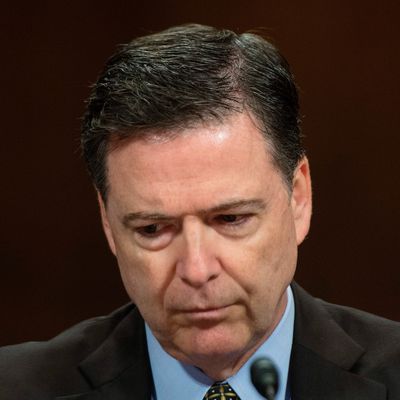
In initialing a two-and-a-half page memo to the U.S. attorney general today, Deputy Attorney General Rod Rosenstein, the memo’s ostensible author, torched his long and illustrious career. (Before assuming his current post in April, he had been a fine U.S. attorney in Baltimore for 12 years.)
The memo, creepily and manifestly irrelevant on its face, provided Attorney General Jeff Sessions, who had agreed to recuse himself from his department’s ongoing criminal investigation into links between Russia and the Donald Trump campaign, the pretext he needed to recommend firing the man leading that inquiry, FBI Director James B. Comey Jr.
Sessions then wrote a one-paragraph letter to Trump, recommending that he fire Comey, claiming to rely on the Rosenstein memo.
In the final leg of the charade, Trump wrote a letter to Comey firing him, “effective immediately,” purporting to rely on Sessions’s recommendation and the reasoning of the Rosenstein memo.
The Rosenstein memo faults Comey for two actions, each in the now distant past, and each of which has been lavishly praised by both candidate Trump and President Trump on dozens of occasions in the intervening months. The first pretext for Comey’s removal occurred on July 5, 2016, when Comey held a press conference announcing the conclusion of the investigation into Hillary Clinton’s emails. The Rosenstein memo faults Comey for holding a press conference at all, and also for making “derogatory” remarks about Clinton’s conduct there — remarks that candidate Trump dined out on for the rest of the campaign. Rosenstein writes that Comey should have just closed the investigation without comment. In support of this portion of his letter, he references criticisms that many former prosecutors from both parties made of Comey at that time — ten months ago.
Rosenstein also briefly criticizes Comey for having, on October 28, 2016 — 11 days before the election — publicly announced that he was reopening the inquiry into Clinton’s emails, an act that candidate Trump instantly transformed into the centerpiece of his campaign, and which Clinton has subsequently blamed for her having lost the election. Rosenstein’s memo omits any reference to Comey’s stated basis for his action, i.e., his having previously testified to Congress that the inquiry was closed and his promise, under oath, to keep Congress apprised of new developments. (Though Comey apparently botched his description of Huma Abedin’s handling of Clinton’s emails in his appearance before Congress on May 3, those statements are not mentioned in the Rosenstein memo.)
Obviously the Rosenstein memo would have been plausible if it had been written last July or August, by high officials in the Loretta Lynch Justice Department, or even if it had been written in January, by high officials of the Sessions Justice Department. But for it to suddenly come out on May 9, 2017, after the nation has watched and listened to Trump warmly defend and commend Comey’s conduct in countless tweets and interviews, renders its content simply incredible. And for it to come down in the midst of a criminal investigation into possible Trump campaign collusion with a hostile foreign power to throw the election to Trump — an investigation to which Rosenstein makes zero reference — is chilling and bizarre. Cheekily, the title chosen for the Rosenstein memo is — get this — “RESTORING PUBLIC CONFIDENCE IN THE FBI.”
The triptych charade employed to fire Comey — the Rosenstein to Sessions to Trump sleight-of-hand — is one of those grand and audacious lies that just leaves you shaking your head. What sort of fools do they take us for?
In fact, it’s one of those lies that’s not really meant to trick anyone. Some lies are just naked assertions of power. They translate into: What are you going to do about it?
Fortunately, we, in America, have an answer to that. We’re going to have a special prosecutor. It may take an act of Congress, but we’re going to have a special prosecutor, Mr. President, and he’s going to press the investigation forward — meticulously, thoroughly, and even-handedly — to a just conclusion.





























